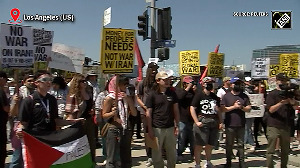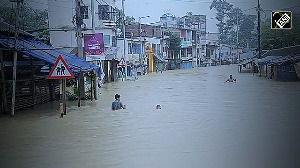Participating in a panel discussion on 'Promising Partners: Israel's Deepening Ties to India and Turkey,' at the annual American Israel Public Affairs Committee's annual policy conference in Washington, DC, Sen, asked to address concern over Iran's clandestine nuclear weapons program, said, "On Iran, our position is clear as far as its nuclear program is concerned."
"We believe that Iran has on its own, voluntarily, accepted certain international obligations and commitments and we believe that Iran should honour those obligations and commitments," he said to sustained applause.
Currently ranked as the most influential foreign policy lobbying organization on Capitol Hill, AIPAC is an American membership organisation with over 100,000 members that seeks to strengthen the relationship between the United States and Israel by supporting US-Israel military, economic, scientific and cultural cooperation and known for making and breaking US lawmakers who either support or are perceived as being anti-Israel.
Many years ago, when former Senator Charles Percy, the moderate Republican chairman of the Senate Foreign Relations Committee, questioned the massive annual military and economic largesse to Israel, AIPAC strongly supported his challenger, Paul Simon, a Democrat, with huge amounts of funds and defeated Percy and sent him into oblivion.
Sen in order to make clear why India was opposed to a nuclear weapons capable Iran, took some hefty swipes against Pakistan without naming it, saying, "I'll tell you straight -- our views and I won't be very diplomatic about it, but we are next to, right adjacent to the biggest sources as well as the destination of proliferation of weapons of mass destruction."
When the moderator Jeffrey Colman, deputy director of policy and government affairs at AIPAC, asked if he was referring to Pakistan, since it seemed obvious that was the country he was taking a dig at, Sen would only repeat, "I said biggest sources and destination of proliferation of WMD and we are also adjacent to the largest global concentration of terrorists and our worst nightmare is a combination of the two."
"And in this overall context," he added, "it is against India's own national security interests to have another nuclear weapons state in our region."
Earlier, Sen in recalling the close India-Israel ties and the commonalities of shared interests, said it was "an aberration" that New Delhi did not establish full diplomatic relations with Tel Aviv till 1992, which he said was due to domestic compulsions that he didn't specify."
While acknowledging that "the Cold War did play a certain part in this regard," the Indian envoy said if was "certain domestic developments in India, which had nothing to do with international politics and also nothing to do with the domestic religious factor," that was responsible for "this gap or absence," that he said was "...an aberration" that had only been cast aside in 1992.
"These (domestic) preoccupations kept us from what I think we would have established full diplomatic relations not in 1992, but we would have done that most certainly by 1988 or the latest by 1989, that is, namely before the end of the Cold War."
However, Sen disclosed, "We had long recognised in the early '80s or even in the '70s, that we have to move ahead and develop a normal relationship with a fellow democracy. So it just took some time to percolate but we lurched from event to event and it got delayed in that process."






